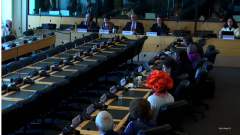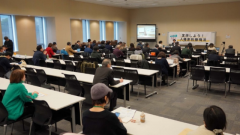UN: CERD adopted concluding observations on Belgium at 103rd session
May 10, 2021
On the 30th of April, the UN Committee on the Elimination of Racial Discrimination (CERD) concluded its 103rd session. At the session, the Committee adopted concluding observations on Belgium.
In accordance with its follow-up procedure, The Committee adopted follow-up letters to Iceland, Jordan, Mexico, Poland and the State of Palestine. Read our summary of the follow-up letters.
The Committed adopted lists of issues prior to reporting (LOIPRs) on Gabon, Lesotho, Maldives and Tunisia.
On inter-state communications, the Committee adopted a decision regarding the communication submitted by the State of Palestine against the State of Israel. In its decision, the Committee rejected the exceptions raised by Israel concerning the admissibility of the communication. The Committee requested the Chair to appoint, in accordance with Article 12 (1) of the Convention, the members of an ad hoc Conciliation Commission.
The Committee issued letters to Brazil, Canada, Indonesia, Kazakhstan and Peru under its Early Warning and Urgent Action procedure. It also adopted a statement on “Rise of racial discrimination against Asians and people of Asian descent”.
Under the individual communications procedure, The Committee adopted an opinion on Grigore Zapescu v. Republic of Moldova (CERD/C/103/D/60/2016). It found that the Republic of Moldova has violated the right to remedies and protection under Article 6 of the Convention in the case of discrimination in recruitment against the petitioner who is of Roma ethnicity.
Concluding observations, reports of the States parties and other stakeholders are available at the OHCHR website. Video archives of the public meetings with the delegation of Belgium can be accessed at UN Web TV.
Belgium
 The Committee asked a series of questions to the State party concerning the situation of migrants, minorities and people of African descent, as well as legal and policy measures to combat racial discrimination, and its cooperation with civil society including in the preparation of the periodic report. Ongoing developments in the establishment of an independent national human rights institution (NHRI) and the adoption of a national action plan against racism drew the Committee’s attention including their potential mandate to handle individual complaints. The Committee expressed a concern on the announcement of the Flemish government to withdraw its cooperation with the Interfederal Centre for Equal Opportunities and Opposition to Racism (unia). Questions related to law enforcement and racial discrimination were posed to the State party such as racial profiling, police violence and human rights training for law enforcement officers. The Committee inquired on measures against racist hate speech and hate crimes including the access to justice for victims. Questions on the situation of migrants including asylum-seekers and refuges ranged from human rights violations in the deportation process, independent monitoring of detention facilities, prevention of statelessness, to revocation of Belgian nationality under anti-terrorism law, human trafficking and recovery of back pay for undocumented migrant workers. The Committee inquired on the national strategy for Roma integration. The State party was encouraged to collect disaggregated data on direct and indirect discrimination including in employment and housing, and to take special measures based on such data. The State party was requested to provide information related to the COVID-19 pandemic such as hate crimes and hate speech against Asians and people of Asian-descent, and the access to health care for minorities and migrants including children, women and people with disabilities belonging to such groups. The Committee acknowledged the State party’s efforts in promoting education on the colonial history, de-colonisation, human rights and anti-racism. The Committee asked the State party on intersecting and multiple forms of discrimination based on race, gender, sexual orientation, gender identity, religion or language including targeted special measures and the ban on religious dress in schools. Read more (English/ French). In its concluding observations, the Committee issued recommendations concerning following areas (*Recommendations with asterisks [*] are one-year follow-up recommendations.):
The Committee asked a series of questions to the State party concerning the situation of migrants, minorities and people of African descent, as well as legal and policy measures to combat racial discrimination, and its cooperation with civil society including in the preparation of the periodic report. Ongoing developments in the establishment of an independent national human rights institution (NHRI) and the adoption of a national action plan against racism drew the Committee’s attention including their potential mandate to handle individual complaints. The Committee expressed a concern on the announcement of the Flemish government to withdraw its cooperation with the Interfederal Centre for Equal Opportunities and Opposition to Racism (unia). Questions related to law enforcement and racial discrimination were posed to the State party such as racial profiling, police violence and human rights training for law enforcement officers. The Committee inquired on measures against racist hate speech and hate crimes including the access to justice for victims. Questions on the situation of migrants including asylum-seekers and refuges ranged from human rights violations in the deportation process, independent monitoring of detention facilities, prevention of statelessness, to revocation of Belgian nationality under anti-terrorism law, human trafficking and recovery of back pay for undocumented migrant workers. The Committee inquired on the national strategy for Roma integration. The State party was encouraged to collect disaggregated data on direct and indirect discrimination including in employment and housing, and to take special measures based on such data. The State party was requested to provide information related to the COVID-19 pandemic such as hate crimes and hate speech against Asians and people of Asian-descent, and the access to health care for minorities and migrants including children, women and people with disabilities belonging to such groups. The Committee acknowledged the State party’s efforts in promoting education on the colonial history, de-colonisation, human rights and anti-racism. The Committee asked the State party on intersecting and multiple forms of discrimination based on race, gender, sexual orientation, gender identity, religion or language including targeted special measures and the ban on religious dress in schools. Read more (English/ French). In its concluding observations, the Committee issued recommendations concerning following areas (*Recommendations with asterisks [*] are one-year follow-up recommendations.):
- Data collection;*
- National human rights institution;*
- Institutional framework;
- Action plan to combat racism;
- Racist police violence;*
- Racial profiling;
- Racist hate crimes and hate speech;
- Prohibition of organizations inciting racial discrimination;
- Situation of Roma and Travellers;
- Situation of people of African descent;
- Situation of non-nationals, including migrants, refugees, asylum seekers and stateless persons;
- Human trafficking; and
- Human rights education to combat prejudice and intolerance.
Early Warning and Urgent Action Procedure
 Rise of racial discrimination against Asians and people of Asian descent: The Committee adopted a statement concerning increasing violence and manifestations of racism and xenophobia against Asians and people of Asian descent during the COVID-19 pandemic. The Committee expressed concerns that Asian women and girls and those of Asian descent have been particularly targeted by such hostilities. The statement calls on States parties to take following actions:
Rise of racial discrimination against Asians and people of Asian descent: The Committee adopted a statement concerning increasing violence and manifestations of racism and xenophobia against Asians and people of Asian descent during the COVID-19 pandemic. The Committee expressed concerns that Asian women and girls and those of Asian descent have been particularly targeted by such hostilities. The statement calls on States parties to take following actions:
- Reject and condemn racially motivated violence of all forms against Asians and persons of Asian descent;
- Investigate any act of such violence, punish those responsible and provide effective remedies to victims;
- Condemn all expressions of racist hate speech and discriminatory language, in particular by State officials and other public figures, and take measures to protect Asians and people of Asian descent from manifestations of racial discrimination and stigmatisation related to the COVID-19 pandemic;
- Ensure that Asians and people of Asian descent, including women and girls, are not discriminated in any areas of life such as in the workplace, healthcare, or education in the context of the COVID-19 pandemic; and
- Adopt measures to prevent racial discrimination against Asians or people of Asian descent, in particular through education programmes and awareness-raising campaigns.
 Brazil: The Committee sent a follow-up letter on the situation of the building of highways and railroads in the State of Mato Grosso and its impact on Xavante and other indigenous peoples’ rights. The Committee expressed concerns on the adverse impact of the large-scale infrastructure projects, namely Highway BR-080, FICO railway project and small hydropower plants along the rivers “Rio das Mortes” and “Rio Cumbuco”, on Xavante and other indigenous peoples. It raised a particular concern on the reports of the lack of inclusive consultation and the failure to seek to obtain the free, prior and informed consent (FPIC) of all the indigenous peoples affected by the projects. The Committee requested the State party to respond to the concerns in the letter before 14 July 2021 on: (a) the environmental and indigenous studies relating to the building of the highway BR-080; (b) prevention of any adverse impact of the projects on the livelihood and the rights of Xavante and other indigenous peoples; (c) consultation with all Xavante and other indigenous peoples affected by the projects and their FPIC; and (d) review of Interministerial Ordinance nº 60/2015. The Committee also requested information on the administrative situation of National Indian Foundation (FUNAI), especially on their mandate to demarcate indigenous people´s territories and lands.
Brazil: The Committee sent a follow-up letter on the situation of the building of highways and railroads in the State of Mato Grosso and its impact on Xavante and other indigenous peoples’ rights. The Committee expressed concerns on the adverse impact of the large-scale infrastructure projects, namely Highway BR-080, FICO railway project and small hydropower plants along the rivers “Rio das Mortes” and “Rio Cumbuco”, on Xavante and other indigenous peoples. It raised a particular concern on the reports of the lack of inclusive consultation and the failure to seek to obtain the free, prior and informed consent (FPIC) of all the indigenous peoples affected by the projects. The Committee requested the State party to respond to the concerns in the letter before 14 July 2021 on: (a) the environmental and indigenous studies relating to the building of the highway BR-080; (b) prevention of any adverse impact of the projects on the livelihood and the rights of Xavante and other indigenous peoples; (c) consultation with all Xavante and other indigenous peoples affected by the projects and their FPIC; and (d) review of Interministerial Ordinance nº 60/2015. The Committee also requested information on the administrative situation of National Indian Foundation (FUNAI), especially on their mandate to demarcate indigenous people´s territories and lands.
 Canada: The Committee issued a letter to the State party concerning Mi’kmaw indigenous peoples in Nova Scotia, in particular Mi’kmaw fishers, who had been reportedly subject to racist hate speech and violence by non-indigenous fishers including with firearms and destruction of their properties between September and December 2020. These attacks were allegedly carried out to obstruct the Mi’kmaw traditional fishing activities launched in September 2020, which is considered by non-indigenous fishers as illegal and threatening to conservation efforts. Canadian authorities are accused to have failed to prevent the acts and to protect the Mi’kmaw fishers and their properties, despite being aware of the high risk of violence. They are also accused to have failed to fully investigate the complaints of racially motivated acts against Mi’kmaw human rights defenders and fishers. The Committee requested the State party to provide information on measures in response to the letter before 14 July 2021 on: (a) investigation into the series of attacks by private actors against Mi’kmaw indigenous peoples; (b) investigation of the alleged lack of adequate response by relevant authorities to effectively prevent and protect Mi’kmaw indigenous peoples from such acts; (c) prevention of further acts of violence, racist hate speech, incitement of violence and destruction of property against Mi’kmaw indigenous peoples; and (d) respect and protection of the rights of Mi’kmaw peoples in relation to their fishing activities and territories. The Committee also requested the State party to provide details on the status of the treaties concluded between 1760 and 1761 and the implementation of Mi’kmaq fishing rights under such treaties.
Canada: The Committee issued a letter to the State party concerning Mi’kmaw indigenous peoples in Nova Scotia, in particular Mi’kmaw fishers, who had been reportedly subject to racist hate speech and violence by non-indigenous fishers including with firearms and destruction of their properties between September and December 2020. These attacks were allegedly carried out to obstruct the Mi’kmaw traditional fishing activities launched in September 2020, which is considered by non-indigenous fishers as illegal and threatening to conservation efforts. Canadian authorities are accused to have failed to prevent the acts and to protect the Mi’kmaw fishers and their properties, despite being aware of the high risk of violence. They are also accused to have failed to fully investigate the complaints of racially motivated acts against Mi’kmaw human rights defenders and fishers. The Committee requested the State party to provide information on measures in response to the letter before 14 July 2021 on: (a) investigation into the series of attacks by private actors against Mi’kmaw indigenous peoples; (b) investigation of the alleged lack of adequate response by relevant authorities to effectively prevent and protect Mi’kmaw indigenous peoples from such acts; (c) prevention of further acts of violence, racist hate speech, incitement of violence and destruction of property against Mi’kmaw indigenous peoples; and (d) respect and protection of the rights of Mi’kmaw peoples in relation to their fishing activities and territories. The Committee also requested the State party to provide details on the status of the treaties concluded between 1760 and 1761 and the implementation of Mi’kmaq fishing rights under such treaties.
 Indonesia: The Committee sent a follow-up letter on the lack of the State recognition of indigenous peoples and its implications to the enjoyment of their rights. The Committee reiterated its concern that the domestic law of Indonesia does not guarantee the respect for the principle of self-identification by indigenous peoples. In addition, the adoption of the Omnibus Law on Job Creation (Law 11/2020 of 3 November 2020) was reportedly drafted and passed without proper consultation with indigenous peoples, though the Law would weaken the existing protections of indigenous peoples’ rights. The Law would also allow the government to arbitrarily declare some lands as ‘abandoned’ and acquire indigenous peoples’ lands without any free, prior and informed consent, nor fair and just compensation. Furthermore, the Law would abolish the requirement to conduct environmental impact assessments prior to the commencement of business activities on indigenous peoples’ lands, as well as the requirement of participation of local communities and indigenous peoples in the process of issuing business licenses. The Committee requested the State party to urgently submit its periodic report overdue since 2010, and include information on: (a) safeguards adopted to guarantee the respect of the fundamental principle of self-identification in the determination of indigenous peoples; (b) measures taken to expedite the enactment of the draft bill on the recognition and protection of the rights of indigenous peoples; (c) concrete steps taken to prevent and address the conflicts between indigenous communities and palm oil companies, and to legally protect the rights of these communities in the context of the increasing presence of palm oil plantations and roadbuilding, in particular in the Kalimantan border regions; (d) the status of implementation of the Omnibus Law on Job Creation; and (e) concrete measures for consultations with indigenous peoples affected by the oil palm industry and other large-scale projects, and to obtain their free, prior and informed consent.
Indonesia: The Committee sent a follow-up letter on the lack of the State recognition of indigenous peoples and its implications to the enjoyment of their rights. The Committee reiterated its concern that the domestic law of Indonesia does not guarantee the respect for the principle of self-identification by indigenous peoples. In addition, the adoption of the Omnibus Law on Job Creation (Law 11/2020 of 3 November 2020) was reportedly drafted and passed without proper consultation with indigenous peoples, though the Law would weaken the existing protections of indigenous peoples’ rights. The Law would also allow the government to arbitrarily declare some lands as ‘abandoned’ and acquire indigenous peoples’ lands without any free, prior and informed consent, nor fair and just compensation. Furthermore, the Law would abolish the requirement to conduct environmental impact assessments prior to the commencement of business activities on indigenous peoples’ lands, as well as the requirement of participation of local communities and indigenous peoples in the process of issuing business licenses. The Committee requested the State party to urgently submit its periodic report overdue since 2010, and include information on: (a) safeguards adopted to guarantee the respect of the fundamental principle of self-identification in the determination of indigenous peoples; (b) measures taken to expedite the enactment of the draft bill on the recognition and protection of the rights of indigenous peoples; (c) concrete steps taken to prevent and address the conflicts between indigenous communities and palm oil companies, and to legally protect the rights of these communities in the context of the increasing presence of palm oil plantations and roadbuilding, in particular in the Kalimantan border regions; (d) the status of implementation of the Omnibus Law on Job Creation; and (e) concrete measures for consultations with indigenous peoples affected by the oil palm industry and other large-scale projects, and to obtain their free, prior and informed consent.
 Kazakhstan: The Committee sent a follow-up letter on the ethnic-based violence against persons belonging to the Dungan minority committed by non-Dungan persons in the villages of Masanchi, Sortobe, Bular-Batyr, and Aukhatty, Korday District, Jambyl Oblast in the country in February 2020. While it took note of the State party’s response to the previous letter, the Committee expressed concerns on the reports of obstructions and intimidations against the affected community in accessing the court in Taraz, as well as the allegations of arbitrary arrests and torture against persons belonging to the Dungan minority and their defendants. Many Dungans remain afraid of the possible recurrence of violence against them and concerned about possible obstacles, such as denial of access to rented lands and water supply. The Committee requested the State party to provide information in response to the letter before 14 July 2021 on: (a) the results of investigations into the violence in February 2020, including details on convictions, acquittals and sentences against Dungan or non-Dungan persons; (b) the steps taken by the government to make information on the results of these investigations accessible to all persons and communities affected; (c) measures taken to investigate allegations of torture and violence by law enforcement officers on the Dungan defendants; (d) measures taken to ensure the participation of all interested parties in the court proceedings; (e) measures taken to investigate allegations that law enforcement officers solicited signed guarantees from Dungan persons to prevent their participation in the court proceedings; (f) any progress in rebuilding houses and businesses and in providing compensation and assistance to the Dungan victims of the violence; and (g) measures taken to strengthen trust in State institutions as well as to enhance tolerance among the communities affected.
Kazakhstan: The Committee sent a follow-up letter on the ethnic-based violence against persons belonging to the Dungan minority committed by non-Dungan persons in the villages of Masanchi, Sortobe, Bular-Batyr, and Aukhatty, Korday District, Jambyl Oblast in the country in February 2020. While it took note of the State party’s response to the previous letter, the Committee expressed concerns on the reports of obstructions and intimidations against the affected community in accessing the court in Taraz, as well as the allegations of arbitrary arrests and torture against persons belonging to the Dungan minority and their defendants. Many Dungans remain afraid of the possible recurrence of violence against them and concerned about possible obstacles, such as denial of access to rented lands and water supply. The Committee requested the State party to provide information in response to the letter before 14 July 2021 on: (a) the results of investigations into the violence in February 2020, including details on convictions, acquittals and sentences against Dungan or non-Dungan persons; (b) the steps taken by the government to make information on the results of these investigations accessible to all persons and communities affected; (c) measures taken to investigate allegations of torture and violence by law enforcement officers on the Dungan defendants; (d) measures taken to ensure the participation of all interested parties in the court proceedings; (e) measures taken to investigate allegations that law enforcement officers solicited signed guarantees from Dungan persons to prevent their participation in the court proceedings; (f) any progress in rebuilding houses and businesses and in providing compensation and assistance to the Dungan victims of the violence; and (g) measures taken to strengthen trust in State institutions as well as to enhance tolerance among the communities affected.
 Peru: The Committee adopted a follow-up letter on the adoption of a new regulation by the Regional Government of Ucayali Ordinance (N° 010-2018-GRUCR) and its impact on the land rights of the Santa Clara de Uchnya indigenous community. The Committee regretted that the State party’s response did not provide information on the guarantee of free, prior and informed consent as well as the protection of the Santa Clara de Uchnya indigenous community from intimidation, violence and harassment by land-traffickers. The Committee reiterated its request to the State party to provide information on these two matters before 14 July 2021.
Peru: The Committee adopted a follow-up letter on the adoption of a new regulation by the Regional Government of Ucayali Ordinance (N° 010-2018-GRUCR) and its impact on the land rights of the Santa Clara de Uchnya indigenous community. The Committee regretted that the State party’s response did not provide information on the guarantee of free, prior and informed consent as well as the protection of the Santa Clara de Uchnya indigenous community from intimidation, violence and harassment by land-traffickers. The Committee reiterated its request to the State party to provide information on these two matters before 14 July 2021.





